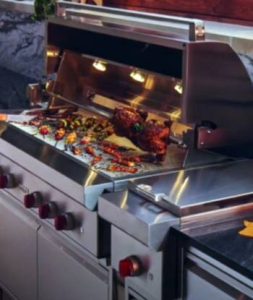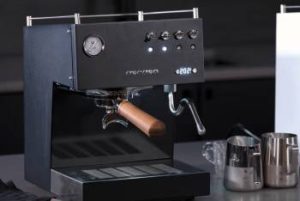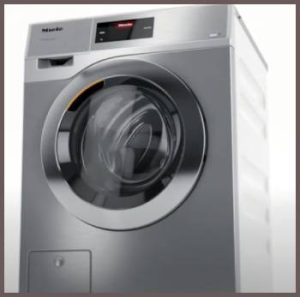Induction cooktops have revolutionized the way we cook. They provide precise control, energy efficiency, and safety that traditional gas or electric stovetops can’t match. Among the leaders in this cutting-edge technology are Miele and Bosch, two reputable brands known for their commitment to quality and innovation.
But how do they stack up against each other? Let’s delve into an in-depth comparison between Miele and Bosch induction cooktops.
A Brief Comparison Table
| Miele Induction Cooktop | Bosch Induction Cooktop | |
| Temperature Control | Excellent with QuickStart & AutoHeat | Excellent with FlexInduction & PerfectFry |
| Cooking Area | Large and flexible | Variable, with FlexInduction for larger cookware |
| Efficiency | High with Con@ctivity 2.0 | Slightly lower than Miele |
| Innovation | High with features like Con@ctivity 2.0 | High with features like PowerMove and PerfectFry |
| Flexibility | High | Slightly higher due to FlexInduction |
| Price Point | Higher | More affordable |
| Ease of Use | User-friendly but requires certain types of cookware | User-friendly but may require learning for first-time users |
| Lifespan | 10-20 years (depending on care and usage) | 10-20 years (depending on care and usage) |
The Miele Induction Cooktop: Excellence in Efficiency
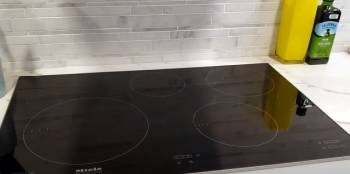
Miele, a German company with over a century’s experience in home appliances, ensures their induction cooktops offer a sublime cooking experience. With Miele, you get the convenience of QuickStart for instant cooking and AutoHeat for maintaining the temperature. These features come in handy when you’re preparing meals that require careful temperature adjustments.
Miele’s induction cooktops also boast a large cooking area, allowing users to accommodate multiple pots and pans. Plus, their Con@ctivity 2.0 technology automatically adjusts the range hood based on what’s happening on the cooktop, contributing to a more efficient and pleasant cooking environment.
Pros:
- Precise temperature control
- Wide cooking area
- Energy efficient
Cons:
- Higher price point
- Requires certain types of cookware
Read More: About InvisaCook
The Bosch Induction Cooktop: Synonymous with Sophistication
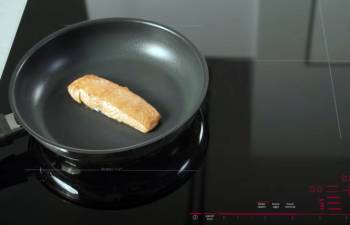
Bosch, another stalwart in the German home appliance market, shines in the induction cooktop field as well. Bosch cooktops feature FlexInduction technology, allowing you to combine cooking zones into one for larger cookware. It’s a boon when you’re making a big meal and need more space.
Their PowerMove function lets you shift your cookware from one zone to another, automatically adjusting the power levels. With PerfectFry technology, Bosch ensures a perfect fry every time with constant temperature control.
Pros:
- High flexibility with FlexInduction
- Automatic power level adjustment
- Excellent for frying
Cons:
- Slightly less efficient than Miele
- May require a learning curve for first-time users
Miele vs Bosch: The Showdown
Both Miele and Bosch induction cooktops excel in delivering high performance, but they have distinct advantages. Miele shines in efficiency and innovation, while Bosch impresses with its sophistication and flexibility.
While choosing between Miele and Bosch can be difficult, remember to consider your cooking habits, budget, and kitchen space. Both brands produce reliable, high-quality induction cooktops, but your unique needs will determine which one is the best fit.
Frequently Asked Questions (FAQs)
The “best” induction cooker varies depending on individual needs. Miele and Bosch both offer excellent options with distinct advantages. Miele is known for efficiency and innovation, while Bosch is popular for flexibility and sophistication.
Absolutely. Bosch induction cooktops are renowned for their quality, innovative features like FlexInduction and PerfectFry, and their ability to deliver precise cooking control.
Yes, Bosch induction cooktops are designed and manufactured in Germany, a country known for its excellent engineering and quality control.
Yes, Miele produces a range of high-quality induction cooktops known for their efficiency, wide cooking area, and innovative features like QuickStart and AutoHeat.
While the lifespan of an induction cooktop can vary based on usage and care, Bosch induction cooktops are generally expected to last between 10 and 20 years. Bosch is known for its durable, high-quality appliances and provides a warranty to support its products.
Bosch is a German brand, and while it does have manufacturing plants globally, including in China, its induction cooktops are primarily designed and manufactured in Germany, ensuring high-quality products and strict quality control.
Read More: About GE Cafe Vs. Monogram Induction Cooktop
Concluding Thoughts
Whether you’re drawn to the energy efficiency and innovative features of Miele or the flexibility and sophistication of Bosch, one thing is clear: both these brands have transformed the kitchen landscape with their induction cooktops. They bring together the elegance of design and the efficiency of technology, making them highly desirable for any modern kitchen.
It’s a close call between Miele and Bosch induction cooktops, as they each bring their own unique strengths to the table. Both brands are poised to continue their tradition of innovation and quality, leading the way in the future of induction cooking.
While this comprehensive comparison should help guide your decision, your choice ultimately depends on your individual needs and preferences. Whichever brand you choose, rest assured you’ll be getting a quality product that will take your cooking experience to new heights.
Remember, the heart of the home is the kitchen. By choosing either Miele or Bosch, you’ll be ensuring that the heartbeat is strong, efficient, and innovative.

